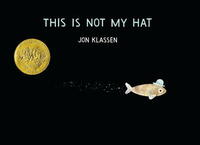Take a photo of a barcode or cover
Keywords: fish, morals, consequences, food chain?
I couldn’t resist this follow-up to I Want My Hat Back, a favorite of 2011. I was skeptical though. I mean, I Want My Hat Back was so good and was he just capitalizing… You will be delighted and potentially disgusted to know that This is Not My Hat is excellent in many ways similar to I Want My Hat Back, yet still its own.
A little fish steals a big fish’s hat. He isn’t apologetic, in fact, he is quite bold to tell his audience that he is going to get away from it. First the big fish will not wake up until he is long gone. He won’t know who took it, and the crab will not tell him where the thief and hat have gone. And the big fish will certainly not find the little fish in the forest of plant-life.
Of course, as he is boasting in text we see the opposite happening in illustration. No extravagance needed. And how does it end? Yeah, stealing is bad.
You see how the style is much the same, and there is a sequence of the big fish returning past the crab which reminds one of I Want My Hat Back, too. He returns with great color, density, texture and scale. But Klassen creates differentiation: landscape instead of portrait, black backdrop vs white, underwater instead of above, and the hats are shaped differently. Also the tone, the boasting as opposed to the query.
This is one to be experienced to fully appreciate, especially if you are needing a good laugh.
L (omphaloskepsis)
http://contemplatrix.wordpress.com/2012/10/31/book-this-is-not-my-hat/
A little fish steals a big fish’s hat. He isn’t apologetic, in fact, he is quite bold to tell his audience that he is going to get away from it. First the big fish will not wake up until he is long gone. He won’t know who took it, and the crab will not tell him where the thief and hat have gone. And the big fish will certainly not find the little fish in the forest of plant-life.
Of course, as he is boasting in text we see the opposite happening in illustration. No extravagance needed. And how does it end? Yeah, stealing is bad.
You see how the style is much the same, and there is a sequence of the big fish returning past the crab which reminds one of I Want My Hat Back, too. He returns with great color, density, texture and scale. But Klassen creates differentiation: landscape instead of portrait, black backdrop vs white, underwater instead of above, and the hats are shaped differently. Also the tone, the boasting as opposed to the query.
This is one to be experienced to fully appreciate, especially if you are needing a good laugh.
L (omphaloskepsis)
http://contemplatrix.wordpress.com/2012/10/31/book-this-is-not-my-hat/
dark
funny
lighthearted
medium-paced
Plot or Character Driven:
Plot
Strong character development:
No
Loveable characters:
Yes
Diverse cast of characters:
N/A
Flaws of characters a main focus:
Yes
John Klassen is a master of darkly hilarious children’s books. Scrap that. Books. Forget the kids. Enjoy his work for yourself, as a grown up. A masterclass in comedy.
Another fave! I should probably just buy all of the Jon Klassen books for the library at this point. Summer Reading was so much fun this year, and when I got to read this to my kids, we had so much fun coming up with what happened!!
Ackkkk this book is hilarious. You have to read it aloud to other people and show them the pictures. Don't read anything about it just go find it and read it and enjoy it.
This book is rather silly in nature, but is a good allegory for refraining from stealing. The images are quite simplistic in nature, but that is ok for this book because they get the point across.
AUDIO
Mixed feelings on this one. Only the audiobook copy was available to me, and while the addition of fast-paced string music really elevated the listening and conveyed tone, it nearly overshadowed the words. I listened twice and still don't quite know what was going on, other than a fish had stolen a hat.
Much of my evaluation comes from reading the reviews in addition to my own experience. Many people point out that the sinister nature and morality of the tale are darker than traditional children's picture books, and for that, I think this book is valuable. But without having read this book's predecessor and without context, I'm not exactly sure what lesson we're supposed to be teaching here? Not to steal? If you steal you'll get eaten? Seems a bit more like a scare tactic than a lesson.
I hope to read the physical version to see if my opinion changes.
Mixed feelings on this one. Only the audiobook copy was available to me, and while the addition of fast-paced string music really elevated the listening and conveyed tone, it nearly overshadowed the words. I listened twice and still don't quite know what was going on, other than a fish had stolen a hat.
Much of my evaluation comes from reading the reviews in addition to my own experience. Many people point out that the sinister nature and morality of the tale are darker than traditional children's picture books, and for that, I think this book is valuable. But without having read this book's predecessor and without context, I'm not exactly sure what lesson we're supposed to be teaching here? Not to steal? If you steal you'll get eaten? Seems a bit more like a scare tactic than a lesson.
I hope to read the physical version to see if my opinion changes.





